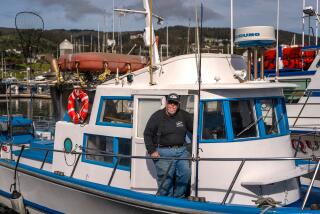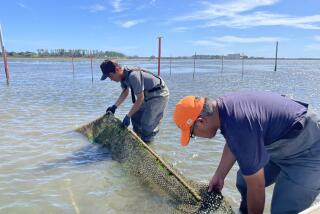Dual Struggles for Survival in the Waters Off Scotland
- Share via
PETERHEAD, Scotland — The tales that Scottish fishermen tell these days are not about the big one that got away but about the cod they could not find.
Stocks of Britain’s favorite fish have dwindled to such dangerously low levels in the North Sea that locals say they fear extinction--of the Scottish cod fisherman.
In an effort to protect cod spawning grounds, an 11-week emergency ban on trawling went into effect Wednesday covering about 40,000 square miles of water, or nearly one-fifth of the North Sea.
Fishermen in Peterhead, home to Britain’s largest white-fish fleet, say that the ban is long overdue and that the European Union’s failure to act sooner may spell the end of a way of life that has sustained their families for generations.
“It’s a little like shutting the barn door after the horse has bolted,” said James Buchan, skipper of the 70-foot trawler Amity. “The ban is good, but is it too little too late?”
Buchan, 40, is responding to the crisis by refitting his boat with smaller nets for prawn fishing, a $15,000 undertaking that only some of the fishermen can manage. He acknowledges that short-term solutions such as his may lead to other long-term problems, such as overfishing of prawns, haddock and whiting.
“If you close one area, you are increasing pressure on another,” Buchan said. But pointing to members of his five-man crew, he added: “I’ve got these men to pay and they’ve got children. I’ve got a mortgage. This boat must be working.”
Fishing has always been a cyclical business, and Peterhead has seen many turns in its fortunes. The town in northeastern Scotland was Britain’s busiest whaling port in the mid-19th century until the stocks of beluga and bottlenose whales became so depleted that it was no longer worth going after them.
Peterhead fishermen turned to herring, and business took off with such speed that Thomas Southwell, a fellow of the local Zoological Society, lamented in 1885 “that there can be no doubt that we are working in the dark, not knowing whether we are overfishing the once-teeming waters or not.”
World wars I and II protected the North Sea herring stock for a while, as the British government commandeered fishing boats and turned Peterhead into a naval base. Afterward, however, new and better trawlers meant fishermen could catch three times the herring in half as many days. As the herring began to disappear in the 1960s, Peterhead switched to white fish--haddock, whiting and the more valuable cod.
Fish Population Far Below Level of 1970s
Now the cod is fighting to survive in the North Sea. EU officials estimate that there are about 70,000 tons of adult cod in the area covered by the ban, far below the 1970s level of 250,000 tons and about half the minimum that scientists say is needed to guarantee the fish’s survival there.
The blame is laid at many feet. The one-net fishermen point at their competitors with two nets. The guys with small boats say it is the fault of the big operators. Fishing organizations say they have been keeping to the quotas recommended by scientists and imposed by EU officials, but their members say they knew the numbers were set too high back in 1999, when they managed to catch just 60% of the EU quota of 81,000 tons. Britain’s quota for North Sea cod was subsequently reduced to less than 42,000 tons.
Cod fishermen say they are not the only predators eating into stocks. Seals grab more cod than they do, they claim, and the Danes are fishing sand eels, limiting the cod’s food supply. Many believe that global warming has been heating up the sea and affecting cod.
Whatever the reasons, scientists and fishermen agree that more action is required to protect the reduced stocks. Under the best of circumstances, the ban will increase the breeding success by just 5% to 15%, according to Hamish Morrison, chief executive of the Scottish Fisheries Organization.
It is the first step in a five-year plan that includes requiring new nets that will allow smaller fish to escape, setting a higher minimum size for fish to be landed and limiting the number of boats out fishing. Morrison said his organization is proposing a 20% reduction in the size of fleets.
Joy Is Fading From a Job Many Once Loved
In 1998, he said, the average Scottish boat crew brought in 210 tons of white fish, compared with 140 tons a year now. That is hardly enough to support the skipper and crew, particularly as less and less of the haul is cod, which is worth at least twice as much as the other white fish.
“Why would anyone want to fish his brains out for less money? Fishermen may be many things, but they’re not simple,” Morrison said.
Many fishermen say the scarcity is taking the joy out of a job they once loved.
“It used to be a good life,” George Runcie, 50, skipper of the Ocean Challenge, said as he unloaded 180 boxes of fish with his son and brother-in-law on a cold, clear morning in what passes for spectacular weather in a Scottish winter.
“We’ve always been fishermen. It’s in the blood. The fresh air, the thrill of a good catch,” Runcie said. “Until four years ago, I never worked a weekend. But today we can’t make the same living in seven days we used to do in four or five. The fish aren’t there.”
Joe Morgan, 37, whose ancestors “as far back as you can go” were fishermen, said a job once filled with excitement and camaraderie has turned sour.
“I am gone for 10 days, home for two and out again. My daughter is 14, and I can’t remember her growing up. It’s pretty sad. I hope I’m the end of the line,” said Morgan, who also has 10- and 12-year-old boys. “I’ll try to steer them in a different direction.”
Fishermen say that if the low fish stocks don’t push the next generation out of the boats, high fuel prices and the draw of more lucrative work in North Sea oil fields will. They are urging the British government to compensate fishermen during the current restrictions. Otherwise, according to Morgan, “once the ban is over, there will be no fishermen left.”
It is an overstatement, but it reflects the mood. Fishermen worry that the cod stocks will not come back to the North Sea, as they haven’t off the coast of Newfoundland, where a ban was imposed a decade ago. The effect on fishing towns in Scotland and England will be huge, they say.
“It’s not just the fishing boats. It’s the shipyards, the lorry drivers, ice merchants. When the fishermen are not making money, the shops feel it as well,” said Runcie’s brother-in-law, Bill Thompson.
The cod is far from becoming extinct--the Bering Sea still produces about 800,000 tons a year, and Britain meets its demand for batter-dipped fish and chips with Icelandic cod, although the price of the national dish is creeping upward. But Thompson, 52, figures things do not look good for the North Sea.
“This is the worst I’ve ever seen it,” he said. “You take things out and, see, you’re not putting anything back in, are you?”
Runcie wasn’t quite so gloomy. Nodding at his 26-year-old son, he said: “When I was his age, they told me fishing was finished. I’ve had two boats since then.”
More to Read
Sign up for Essential California
The most important California stories and recommendations in your inbox every morning.
You may occasionally receive promotional content from the Los Angeles Times.













